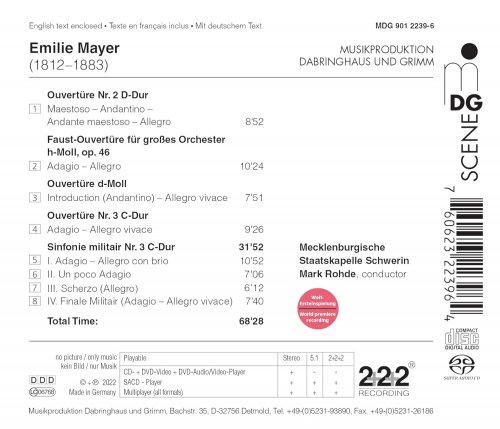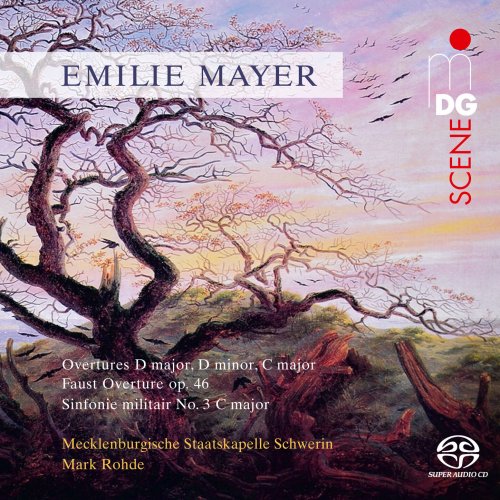
Mecklenburgische Staatskapelle Schwerin, Mark Rohde - Mayer: Orchestral Works (2022)
BAND/ARTIST: Mecklenburgische Staatskapelle Schwerin, Mark Rohde
- Title: Mayer: Orchestral Works
- Year Of Release: 2022
- Label: Musikproduktion Dabringhaus und Grimm (MDG)
- Genre: Classical
- Quality: flac lossless (tracks)
- Total Time: 01:08:26
- Total Size: 255 mb
- WebSite: Album Preview
Tracklist
01. Overture No. 2 for Orchestra in D Major: Maestoso - Andantino - Andante maestoso - Allegro
02. Faust-Overture for Big Orchestra in B-Flat Minor, Op. 46: Adagio - Allegro
03. Overture for Orchestra in D Minor, "Introduction": Andantino - Allegro vivace
04. Overture No. 3 for Orchestra in C Major: Adagio - Allegro vivace
05. Sinfonie Militair No. 3 in C Major: I. Adagio - Allegro con brio
06. Sinfonie Militair No. 3 in C Major: II. Un poco Adagio
07. Sinfonie Militair No. 3 in C Major: III. Scherzo. Allegro
08. Sinfonie Militair No. 3 in C Major, "Finale Militair": IV. Adagio - Allegro vivace

That's what happens when you let yourself be guided by prejudices: Emilie Mayer's contemporaries in the mid-19th century were unaware of the outstanding quality of her compositions because they only saw the woman instead of the composer. You might think you missed something when you listen to the brand-new Super Audio album of the Mecklenburgische Staatskapelle: with chief conductor Mark Rohde on the podium, the musicians from Schwerin succeed in a salvation of honor that could not be more attractive. Financially independent at an early age, Emilie Mayer was able to devote herself entirely to her passion for composing. Her misfortune: instead of salon music, which was at best acceptable to women, she ventured into the grand form. Eight symphonies alone came from her pen, as well as several overtures, of which only the "Faust" overture appeared in print during her lifetime. Interestingly, in her interpretation of Faust, Mayer places Gretchen at the center, the brooding seriousness receding in favor of Margareth's naivety and piety. In her earlier works, the composer orientates herself on classical models; the overtures No. 2 and 3 hint at memories of Haydn and Mozart. But she is also no stranger to the romantic, and the D minor overture unfolds a world of sound reminiscent of Bruckner. The most extensive work of this commendable new publication is the "Sinfonie militair", whose genesis can perhaps be traced back to the influence of Mayer's teacher, the Prussian military musician Wieprecht. But here, too, Mayer finds a very individual approach: instead of triumphant sounds, an adagio of deep seriousness ends the half-hour opus - an ending that leaves room for far-reaching associations.
01. Overture No. 2 for Orchestra in D Major: Maestoso - Andantino - Andante maestoso - Allegro
02. Faust-Overture for Big Orchestra in B-Flat Minor, Op. 46: Adagio - Allegro
03. Overture for Orchestra in D Minor, "Introduction": Andantino - Allegro vivace
04. Overture No. 3 for Orchestra in C Major: Adagio - Allegro vivace
05. Sinfonie Militair No. 3 in C Major: I. Adagio - Allegro con brio
06. Sinfonie Militair No. 3 in C Major: II. Un poco Adagio
07. Sinfonie Militair No. 3 in C Major: III. Scherzo. Allegro
08. Sinfonie Militair No. 3 in C Major, "Finale Militair": IV. Adagio - Allegro vivace

That's what happens when you let yourself be guided by prejudices: Emilie Mayer's contemporaries in the mid-19th century were unaware of the outstanding quality of her compositions because they only saw the woman instead of the composer. You might think you missed something when you listen to the brand-new Super Audio album of the Mecklenburgische Staatskapelle: with chief conductor Mark Rohde on the podium, the musicians from Schwerin succeed in a salvation of honor that could not be more attractive. Financially independent at an early age, Emilie Mayer was able to devote herself entirely to her passion for composing. Her misfortune: instead of salon music, which was at best acceptable to women, she ventured into the grand form. Eight symphonies alone came from her pen, as well as several overtures, of which only the "Faust" overture appeared in print during her lifetime. Interestingly, in her interpretation of Faust, Mayer places Gretchen at the center, the brooding seriousness receding in favor of Margareth's naivety and piety. In her earlier works, the composer orientates herself on classical models; the overtures No. 2 and 3 hint at memories of Haydn and Mozart. But she is also no stranger to the romantic, and the D minor overture unfolds a world of sound reminiscent of Bruckner. The most extensive work of this commendable new publication is the "Sinfonie militair", whose genesis can perhaps be traced back to the influence of Mayer's teacher, the Prussian military musician Wieprecht. But here, too, Mayer finds a very individual approach: instead of triumphant sounds, an adagio of deep seriousness ends the half-hour opus - an ending that leaves room for far-reaching associations.
Year 2022 | Classical | FLAC / APE
As a ISRA.CLOUD's PREMIUM member you will have the following benefits:
- Unlimited high speed downloads
- Download directly without waiting time
- Unlimited parallel downloads
- Support for download accelerators
- No advertising
- Resume broken downloads


